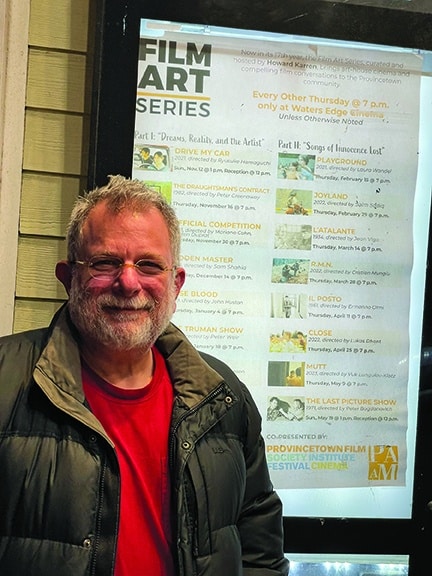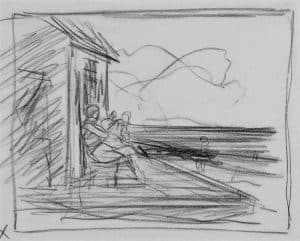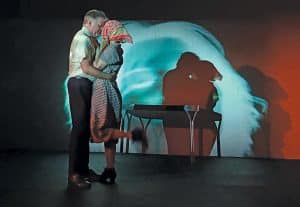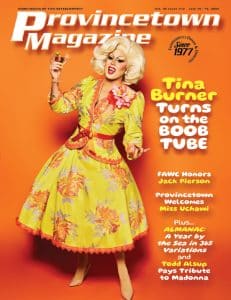Photo: Ed Christie
Howard Karren is the owner of Alden Gallery, a former editor at Premiere Magazine as well as a writer for local publications, including The Provincetown Independent and The Provincetown Banner. But this week, we talk to Howard about the film series he’s been curating for over a decade here in Provincetown, first at the Provincetown Art Association and Museum and now at Waters Edge Cinema.
Provincetown Magazine: When and how did you first become involved with film and what drew you to it in the first place?
Howard Karren: I have always been obsessed with the movies, even as a little kid. I was always a bit of an outsider, and it probably appealed to the voyeur in me. I watched old movies on TV, new movies in local cinemas. I grew up in the New Jersey suburbs of New York City, and when I was old enough, I’d go to see films when they first opened, first run, in Manhattan theaters. I remember seeing The Sound of Music in reserved seats at the Rivoli Theater in Manhattan, a movie palace that’s now gone. I went to see 2001: A Space Odyssey a dozen times, first run in New York, second or third run in New Jersey. I was a total film nerd, into the movie industry as well as the art. I subscribed to Variety at 13 years old after discovering it in the public library. I did it to read the box office reports for all the Manhattan movie houses, and the box office charts for the U.S. and the world.
I always read all the published film critics, and as I got older, my tastes got more sophisticated. I became interested in art films, international films. I always dreamed of being a part of the film industry but didn’t think it would ever actually happen. My parents were scientists, and a career in film was considered absurdly impractical.
But when I got to college, in my sophomore year, I had to decide on my major, and I came to a kind of reckoning. I decided to focus on film, no matter how crazy a notion that was. I was at Brown University in Providence, R.I., and there was no film department, but it was a time when semiotics (the study of signs and linguistics in art) and French structuralist art theory were in vogue. It was possible to be a semiotics major within the English department at Brown, and I signed up, focusing on movies. When it was time for graduate school, I went to film school at Columbia University in New York. This was in 1978. I was going for an M.F.A., but it was in cinema studies, not filmmaking. It was a doctoral track. After I got my master’s, I got tired of studying. I tried a few times to get jobs within the film industry before giving up. I ended up working in journalism, as a magazine editor, and I spent 13 years at Premiere Magazine, a national film magazine. That was a glove fit for me. I went freelance in 2000, and still wrote and edited for Premiere until it folded a few years later. My husband, Ed Christie, and I moved full-time to the Cape — we had built a house in Truro — from New York in 2003. Ed is a puppet builder-designer and art director who worked for Jim Henson and Sesame Street, and we shared a love of art and movies and theater.
PM: How did the Film Art Series begin and why did you want to take on this project?
HK: The series began at the Provincetown Art Association and Museum – PAAM, the nexus for our social life when Ed and I first moved here. A friend of ours, Joe Fiorello, and I were interested in putting together a film series at the Art Association having to do with films about artists, and at the same time, another member, John Ives, was interested in doing screenings as well. Chris McCarthy, PAAM’s director, suggested we all work together. So we did. We called it Film Art, “films about art and films that are art.” This was about 17 years ago. The conditions for screening at PAAM were not good: the seats were uncomfortable, and the projector and sound weren’t high quality. We often didn’t get much of a crowd – especially in the summer – and the losses mounted up. I didn’t want to give up on the screenings, so I held a fund-raiser at my house in Truro. Joe had not been as active in the series, and at that point, John Ives backed out. Also at this time, Gabby Hanna approached me about doing the series at the Waters Edge Cinema, which the Provincetown Film Society had just bought and expanded to two screens. It was then that the series started to become what it is today. We scheduled it over a seven-month season, every two weeks, from November to May, when people were looking for things to do and there wasn’t as much going on. We also sold season passes, which helped pay for the series up front. Plus, with the Film Society as a full partner, we had a great facility in the Waters Edge to present movies. And it took off. We’ve been doing well ever since. I curate the series, putting together about 15 movies, introduce each screening and lead a short discussion afterward. This year we’ve been meeting on every other Thursday at 7 p.m.
PM: What is the criteria you use for curating your film programs?
HK: I try to pick films that thematically go together but that aren’t too similar, so it’s an interesting mix. I often do two or three themes over the seven months, and I try to make one of the themes about artists. This year, for example, the first seven films go under the rubric, “Dreams, Reality, and the Artist” – films about dreamers and visionaries, whether they’re artists or crackpots. The last eight films go under the rubric “Songs of Innocence Lost” – they’re all about worlds that squelch a character’s innocence. I like to pick films that are relatively new and put them alongside older films, going back to the ’30s and beyond. I choose Hollywood productions, American indies, and international films. Fiction and nonfiction. I’ve seen most of them, some at recent festivals, but I also choose stuff I haven’t seen based on who the filmmakers are and critical opinions that I trust. I like to do some queer content, because that’s who I am and a good chunk of the audience. I try to challenge people, and I try to choose titles they more than likely haven’t seen, so I can offer the element of discovery. I don’t want the series to be a parade of people’s favorite films. Connie White, who books the Waters Edge, arranges the screening rights and prints. I’m sometimes restricted by what’s available to screen in a working cinema, which is different than a school or library.
PM: Have audience reactions to film surprised you in this series at all?
HK: I often joke about how grim and depressing my taste in movies is, and I have a hard time finding comedies that I think are worthy of the series. But every once in a while I find one that really clicks with the Film Art audience. One year I picked my favorite Preston Sturges comedy, The Miracle of Morgan’s Creek. It’s a really silly film, almost an exercise by Sturges to see how much he could circumvent the censors. The heroine, played by Betty Hutton, gets pregnant by an unknown soldier whom she only remembers by his name, Ignatz Ratzkywatzky. The Hays Code would not allow a single mom without deep scorn. They also wouldn’t allow her to get pregnant while drunk, so instead she says she got hit on the head and later realizes she got married first before sleeping with him. Things like that. It has none of the social relevance of Sturges’s Sullivan’s Travels, which might have been the obvious choice for Film Art. But the audience loved it. There were howls of laughter.
Because many of the regulars came from PAAM and are either artists or art lovers, I can choose strange and surreal narratives and they’ll run with it. Everything from the abstract Koyaaniqatsi to the screening this year of the Pakistani film Joyland, which is a love story between a married man and a trans woman performer. Both are visually dazzling films that went over incredibly well.
I can’t say this totally surprises me. I find the audience reactions very reassuring. It pushes me to keep seeking excellent work from the fringes of familiarity.
The Film Art Series continues Thursdays at 7 p.m. at Waters Edge Cinema, 237 Commercial St., 2nd Fl, Provincetown, through May 9. Thursday, April 11 features Il Posto (1961) directed by Ermanno Olmi. And Thursday, April 23 Close (2022) directed and cowritten by Lukas Dhont will screen. The series ends with a closing celebration on Sunday, May 19 at 12 p.m. For full details visit www.provincetownfilm.org/cinema/film-art-series.











